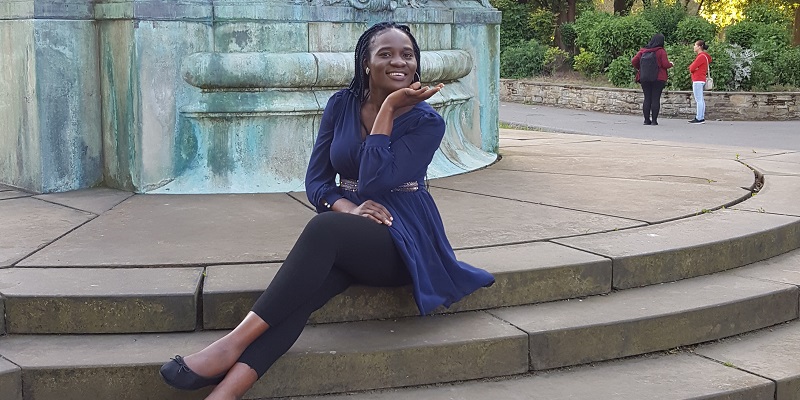Creating an Inclusive Mobility as a Service (MaaS)

Ejiro Matilda Ikoko (MSc Transport Planning) tells us about the support received from the Sustainability Service on her dissertation on the challenge of creating an inclusive Mobility as a Service (MaaS) in Lagos, Nigeria. Ejiro focuses on two vulnerable groups, people with visual impairment and people without smartphones.
What is your favourite thing about the University of Leeds?
Its diversity of cultures and events.
Where did your interest in sustainability come from?
Growing up, I have always believed that there are better ways to achieve results that are beneficial to mankind without causing more problem. I have been very passionate about this, immediately after my high school or secondary school education).
Give us a brief explanation of what this research project is about?
Mobility as a Service (MaaS) are single platforms through which users can access a range of public, shared and private transport options including real-time transport information, bookings and single payment system for their journey.
MaaS is one of the new mobility concepts which could reduce urban transport challenges (air pollution, congestion, etc), the complexity associated with diverse modes of transport (different payment methods, customised mobile application, etc) and enhance the seamless door-door mobility. However, there are potential risks of MaaS which can lead to unintended consequences such as an increase in road congestion due to excess cars on the roads, increase in air pollution, and social exclusion. Social Exclusion is the focus of this research.
Exclusion in MaaS and transportation, in general, creates marginalization in society. It limits people from accessing daily opportunities such as education, work, health care, etc. While there are very limited studies on exclusion in MaaS, no previous research has been identified that examined the risk of exclusion of vulnerable groups in Africa.
This research seeks to investigate how an Inclusive MaaS scheme that addresses the risk of exclusion of two vulnerable groups (Visually impaired people and people without Smartphones) could be designed and implemented, and how regulations can be used to develop an inclusive MaaS. In order to achieve this, it was important to first understand how MaaS will work in Lagos by identifying the facilitators and barriers of adopting MaaS in Lagos; before understanding how an Inclusive MaaS can be developed for the two vulnerable groups.
What are you most enjoying about your research project?
What I enjoyed most about the project was making discoveries and recommendations that will facilitate inclusive mobility for people and vulnerable groups. For example, installation of technologies that will facilitate mobility for the visually impaired, amendment of the transportation law to enhance inclusion for vulnerable groups, and enforcement of such laws. In addition, the project identified barriers and opportunities for MaaS investors in Lagos, and Africa.
Why did you choose this research project?
I grew up witnessing the transportation challenges in Lagos, Nigeria such as congestion, pollution, accidents, unstable transport fares, poor accessibility, and uneven distribution of transport services and lack of transport information My passion to make relevant and sustainable contributions that will facilitate mobility, as well as solve these problems motivated me to choose my research project.
How has the Sustainability Service supported you?
During the 2020 Annual Student Sustainability Conference, I was given the opportunity to present my ideas via poster and PowerPoint presentation where I interacted with my audience by sharing my project and responding to their questions.
Keep up to date on the latest news
-
- Follow us on Twitter: @UoL_Sus
- Follow us on Instagram: @uol_sus
- Follow us on Facebook: @UoLSustainability
- Sign up to our Sustainability newsletter
United Nations Sustainable Development Goals
We use the United Nations Sustainable Development Goals (SDGs) as a framework to guide our activity. Ejiro's work on Creating an Inclusive Mobility as a Service (MaaS) in Lagos, Nigeria is linked to the following SDGs:
-
-
- Goal 3: Good Health and Wellbeing
- Goal 4: Quality Education
- Goal 10: Reduced Inequalities
- Goal 11: Sustainable Cities and Communities
-
Find out more about our impact on the SDGs.
